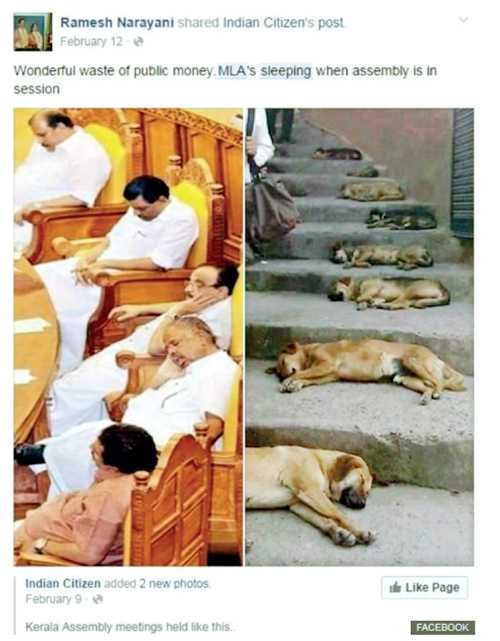Thursday Feb 26, 2026
Thursday Feb 26, 2026
Friday, 24 July 2020 00:15 - - {{hitsCtrl.values.hits}}
In Ancient Greek folklore, a phoenix is a long-lived bird that cyclically regenerates or is otherwise born again. Associated with the sun, a phoenix obtains new life by arising from the ashes of its predecessor. Some legends say it dies in a show of flames and combustion, others that it simply dies and decomposes before being born again. Most accounts say that it lived for 500 years before rebirth. Herodotus, Lucan, Pliny the Elder, Pope Clement I, Lactantius, Ovid, and Isidore of Seville are among those who have contributed to the retelling and transmission of the phoenix motif.
Do we need more than one guess to identify our political phoenix? 
Let sleeping politicians sleep
The Ada Derana of 18 July reports that the “Leader of the United National Party (UNP), Ranil Wickremesinghe says Sri Lanka needs to adopt an agriculture-based economy.” This is rich coming after four previous stints as the Prime Minister of the country when nothing was done despite having an opportunity to do so.
There are many, perhaps even a majority of people in Sri Lanka, who would wish our Parliamentarians be allowed to enjoy an expensive and luxurious sleep like the politicians from Kerala as depicted in the photograph. They could do less harm to the country, and the nett benefit for the country could outweigh the expense.
It is a fallacy that the politicians in general represent the interests of the people of the country. Perhaps they do, but very selectively. No doubt their own interests would be paramount, next their family and then their friends.
It is election season. It is the silly season
In 1970 Mrs Bandaranaike and her campaigners said on political platforms that she will bring rice even from the moon, and the crowds cheered.
Today we hear of various amounts of handouts being promised and huge amounts of money that will be borrowed to pay for these handouts. They are cheered. No one explains how much these will cost and how much will be borrowed and how we will repay the borrowings.
There is no doubt that survival of the people, their wellbeing and the wellbeing of the society will be dependent on some income support and investment in industries that will produce jobs and income earning potential. All this will require overseas borrowing. However, all responsible political combines should inform the public how they are planning to finance their promises as it is the people, the current generation and generations to come who will have to bear the responsibility for repaying these borrowings.
The voters of today are said to be more intelligent than the voters of even 2015, let alone 1970. This remains to be seen. It also remains to be seen whether any political combine including the government will come up with some manageable and believable numbers.
It is also imperative to identify what can be done in the short, medium and long term and give a sense of direction not just to the people but also to the investors who need certainty about the long term sustainability of an economic vision.
The country has had its kings who spearheaded an agricultural economy and built irrigation systems to make it happen. Food security at home was their far sighted vision. The passage of time, and in the post-independence period, leaders appear to have either not honoured their promises on political platforms or not had a vision as their forefathers had to have a plan of action to very simply, have a national policy on food security.
Agriculture policies and the lack of it
The governments of 1965 (Dudley Senanayake) and in 1970 (Sirimavo Bandaranaike) moved towards primacy for food production albeit without a specific long term plan. The government of 1977 (J.R. Jayewardene) reversed all gains made by previous governments by introducing an open economic policy without safeguards for agriculture. However, to their credit, the plan to better manage water for agriculture and electricity through the Mahaveli development scheme was an illustration of a long term vision.
Subsequent governments, and the intervening conflict with the LTTE over 30 years, witnessed a disruption of this long term plan. 
The governments in which Wickremesinghe was the Prime Minister did not see any attention given to agriculture, and even an agriculture policy. Judging by the outcomes, one could say there was an overall policy vacuum in all areas of the economy.
The Mahinda Rajapaksa governments of 2004 and 2010 saw a revival of agriculture especially after the war against the LTTE ended in 2009. The restoration of agricultural tanks and the supply of free fertiliser to increase food production was part of their plan. However, it needs to be said that his government nor any other has had a long term all-encompassing vision and a long term strategy for agriculture. What is important is not just opening land tracts for agriculture, or restoration of tanks, but more specifically to identify what crops, fruit trees, etc. are to be grown, and where, and how the produce would be brought to markets, local and overseas.
Progress in agriculture witnessed a reversal with the election of the government in 2015 (Sirisena/Wickremesinghe). Vast acreages were not cultivated, the fertiliser subsidy was withdrawn and the tank restoration work also suffered a setback.
The common sense, simple logic vision about agriculture for food security, has become a major election manifesto and platform rhetoric, with Wickremesinghe also waking up to an obvious policy although he has had four previous occasions to action such a policy as Prime Minister of the country.
A long term, comprehensive agriculture policy
It is a frequent phenomenon that is witnessed where large quantities of vegetables decay in the fields where they are grown as growers have no way of moving them to markets. Middlemen do this and when there is glut of produce, it becomes uneconomical for them to move produce to markets.
As this writer and many others have pointed out, and as some political combines have embraced, agriculture research must underpin a policy on agriculture. How to maximise on land, on water and yield must become the cornerstones of such a policy. Resources are limited, the effects of climate change are bound to aggravate vagaries of weather cycles, and hence availability of water and ability to cultivate, and the over dependence on chemical fertiliser has made many fields addicts of such fertilisers.
The other vital area yet to be articulated by any political combine is how produced could be moved to markets local and overseas, and also how more value adding could be done with some products. Tinned tomatoes are imported while local fresh tomatoes are allowed to rot. This is just one example.
Sri Lanka could easily satisfy its needs of rice and also becoming a nett exporter. Maximising on land that is cultivated, introduction of varieties that has higher yields, varieties that can grow with less water particularly in dry zones, and in different types of soil, for example a variety that would grow well in the Northern Province are areas for research in addition to many other areas.
The long term target should be to reduce the land being used to cultivate paddy by not compromising on yield, but making land available for other agricultural crops as well as releasing land back for increasing forest cover. Sustainability of the environment has to be an integral part of a future agricultural policy.
It is understood that the current government has already introduced a policy to wean agriculture from harmful chemical fertilisers. The use of alternatives like natural fertiliser (compost) needs to replace chemical fertilisers.
Besides rice and other vegetable products, the fruit industry and a long term strategy for it should also be part of a national agricultural policy. Research could play a major part here too. Fruit trees like avocado and durian, currently huge and impractical from the point of view of efficient harvesting, could be genetically or otherwise modified or selected species could be introduced so that harvesting will be cost efficient and produce will be of better quality. Malaysia has Durian trees where fruits could be picked using small wooden or metal pickers suitable for the types of species that are grown.
The potential for agriculture in Sri Lanka is immense but the country needs a long term consensus vision to provide certainty for investors, both local and foreign as the gestation period to reap yields and dividends is long. Currently, there is no vision or a long term strategy that has consensus from the major political parties.
The bane of our society has been absence of a consensus driven national policy on agriculture with succeeding governments pulling the plug on their predecessor’s policies. Policies on health and education have suffered the same fate. They need to be national policies as they all relate to the ongoing and long term needs of the country. None of them can be limited to five years. Politicians cannot and should not be allowed to limit their commitments to political platforms and manifestos. They should be compelled to work together to arrive at a national consensus on an agriculture policy that is research based, value adding and export oriented where such opportunities exist, and above all, a policy that provides food security to all Sri Lankans. The task of holding politicians to such an agreement must rest with the media, the main stream, as well as the social media.
Politicians who have the cheek and insincerity to wake up from their long years of slumber and utter statements purely to win votes, and then forget the voters and the country, have to be exposed by the media. It will be an affront to the intelligence of the voters to vote again for such phoenixes who had their opportunities in life to put into action what they are uttering today as if they have made a remarkable discovery like Archimedes’ legendary ‘Eureka!’ moment while taking a bath in a tub.
The voters through the mainstream media and social media should demand that their representatives provide their vision and strategy for agriculture so that they can make an informed decision on 5 August.